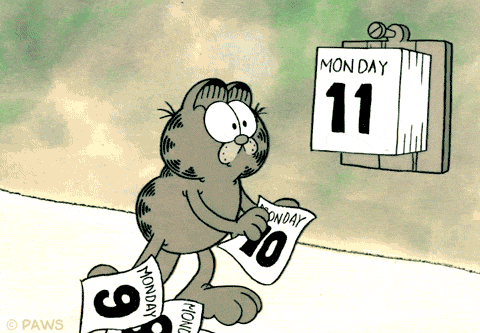Why Mondays are the absolute worst
Plus, the journey of an adorable animal meme
BRAIN WAVES
Monday, Monday. We all know Mondays are the worst, right? Well, now there’s research to back it up. A new study tracked more than 3,500 people aged 50 and up, identifying those who reported feeling anxious on a Monday and those who felt anxious on another day of the week. The scientists then measured cortisol levels via hair samples and compared the results: people who get anxious on Mondays had 23 percent higher stress hormone levels that persisted for months after testing. If you’re a fellow Monday hater, this might not seem surprising. But even retirees who hadn’t worked in years showed elevated stress hormones from the Monday blues. This suggests that, even when you’ve escaped the 9-5 grind, your body somehow doesn’t get the memo. As researcher Tarani Chandola put it: “For some people, Monday blues are not a personal minor inconvenience but a persistent stressor with long-term—perhaps lifelong—detrimental effects on physical and mental health.” But why? Why is Monday so awful? Researchers think it might be because Mondays “present a higher level of uncertainty,” which is a key driver of anxiety and stress. Plus, because Mondays are a weekly occurrence, that repeated stress might accumulate over time so that it persists even when there’s nothing to be stressed about. In other words, it seems to be less about the workweek than it is about the uncertainty. Which explains why Garfield hates Mondays so much despite not having a job.
Awwwww. Looking for a way to beat the Monday Blues? A cute animal video can’t hurt. In a paper published in the Journal of Consumer Research, researchers at Concordia University looked at “digital affective encounters,” better known as adorable animal memes. Specifically, they wanted to understand the emotional journey of cute content that goes viral. To study this, they interviewed Instagram content creators: animal page managers and their followers, then analyzed how the images are created, shared, and reshaped across social media. They found that sharing cute animal content begins with something they called “indexicalization”— when the creator adds emotional cues like a caption, hashtag, or outfit to express affection. Let’s say you post a photo of your bunny wearing a bandana, for example. Next comes re-indexicalization, when followers engage with the post, add their own reactions, and sometimes form mild parasocial bonds with your bunny. Finally, decontextualization happens when a meme page reposts the image, stripping away personal context to make it broadly relatable. The paper highlights the way we use digital content not just to entertain each other, but to express affection, build relationships, and create shared emotional experiences - even with strangers. Who knew that a cute cat video could reveal such complex emotional and social dynamics?
Perfectionism. It’s easy to assume that our push to be perfect is what leads to academic, athletic and professional success. But there are much healthier ways to strive for excellence. Listen to learn more.
ON THE HIDDEN BRAIN PODCAST
Love 2.0: How to Fix Your Marriage, Part 1: Many love stories end when the characters are still in the heady, euphoric early stages of a relationship. But what comes after that intoxicating first phase of love is over? Today, we kick off a new series on the challenges specific to long-term relationships.
ON THE MY UNSUNG HERO PODCAST
Oliver Muensterer’s Story: Minutes before an important job interview, Oliver realized he’d forgotten his dress shirt. A stranger offered a kind and unexpected solution.
Don’t forget to send us the story of your unsung hero! Record a voice memo on your phone and email it to myunsunghero@hiddenbrain.org.
HIDDEN BRAIN ON TOUR!
The Hidden Brain tour continues. Don’t miss your chance to get tickets! Join our host Shankar Vedantam as he brings seven key insights from the first decade of Hidden Brain to the stage. Our next stops:
Saturday, October 11: Baltimore, MD
Sunday, October 12: Washington, D.C.
Saturday, November 22: Los Angeles
MIND GAMES
A petri dish hosts a healthy colony of bacteria. Once a minute every bacterium divides into two. The colony was founded by a single cell at noon. At exactly 12:43 (43 minutes later) the petri dish was half full. At what time will the dish be full?
LAST WEEK’S PUZZLE
A man fell off a 20-foot ladder but did not get hurt. Why not?
The answer: He fell off the bottom step.
A MOMENT OF JOY
Watch the full National Geographic documentary on Jane Goodall.
Have an idea for Hidden Brain? A story you want to share with us? Send an email to ideas@hiddenbrain.org. Listen to us on Spotify, Apple, Amazon Music or your favorite podcast platform.


